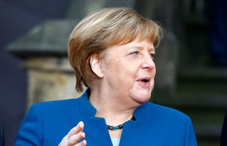
Germany declares two employees of the Russian Embassy to be personae non-gratae
By Tsotne Pataraia
Friday, December 6
The Federal Foreign Office declared two employees of the Russian Embassy in Berlin to be personae non-gratae and expelled from the country, as Russian authorities, despite repeated high-level requests did not sufficiently participate in the investigation of the murder of Zelimkhan Khangoshvili, who was killed on August 23. The killer escaped but was arrested by the German police soon after the incident.
The suspect in the murder of Khangoshvili had a fake passport in the name of Vadim Sokolov. He received the document a week before leaving for the country.
On December 3, German media reported that not the police but the General Prosecutor's Office would investigate the murder of Khangoshvili over the possible involvement of the Russian special services in the case.
According to the German Federal Prosecutor's Office, the Russian authorities are involved in the murder. The GFR Interior Ministry has specified that it will adopt new measures if Moscow does not cooperate in the murder investigation. According to Spiegel magazine, the expelled are Russian intelligence officers disguised as diplomats.
As German Chancellor Angela Merkel said at a NATO summit in Waterford, Germany declared two Russian embassy staffers to be personae non-gratae and expelled them after it became clear that Russia was not cooperating in the investigation of Georgian citizen Zelimkhan Khangoshvili’s assassination:
"I will meet with the Russian president next week and talk to him about it. We made this decision because we could not see that Russia would assist us in the investigation," said Merkel at the NATO summit.
The Kremlin calls the allegations linked to the murder groundless. As the Russian Foreign Ministry said, the expulsion of two of its diplomats by Germany is a "politicized approach" to the investigation and Russia will be forced to "implement a series of retaliatory measures."
The Russian State Duma reacted in a similar way. Duma Foreign Relations Committee Chairman Leonid Slutsky told Interfax that the expulsion of two Russian diplomats from Germany was "an act of Russophobic hysteria" and "an unfriendly move".
Earlier, Russian President Vladimir Putin's spokesman, Dmitry Peskov, repeatedly denied "official Russia's" connection to Khangoshvili's assassination.
In Georgia, the opposition party “European Georgia” accuses the authorities of ignoring Zelimkhan Khangoshvili's murder case. At a December 5 briefing, a member of European Georgia, MP Giorgi Kandelaki, said it was shocking to see the Georgian government's demonstrative ignorance of the case. According to Kandelaki, the Georgian Dream government's attitude to Khangoshvili both in his life and after his death is a striking example of the dramatic erosion of national security:
"The most worrying part is that Mr. Khangoshvili has been working productively with the Georgian state against both Islamic extremism and the elimination of the Russian special services agents in our country," said Georgian MP.
Zelimkhan Khangoshvili, Georgian citizen (ethnic Kist/Chechen) from Georgia’s Pankisi Gorge was shot dead from a close range in central Berlin’s Kleiner Tiergarten Park on August 23 as he was on his way to a mosque. Khangoshvili fought against Russia in the Second Chechen War as well as in the 2008 August War between Georgia and Russia. He has also survived an assassination attempt in Tbilisi in 2015, after which he fled to Ukraine and later to Germany, where he requested asylum.


